Coming Out: Reclaiming Its Celebratory Origins At Dragon Con
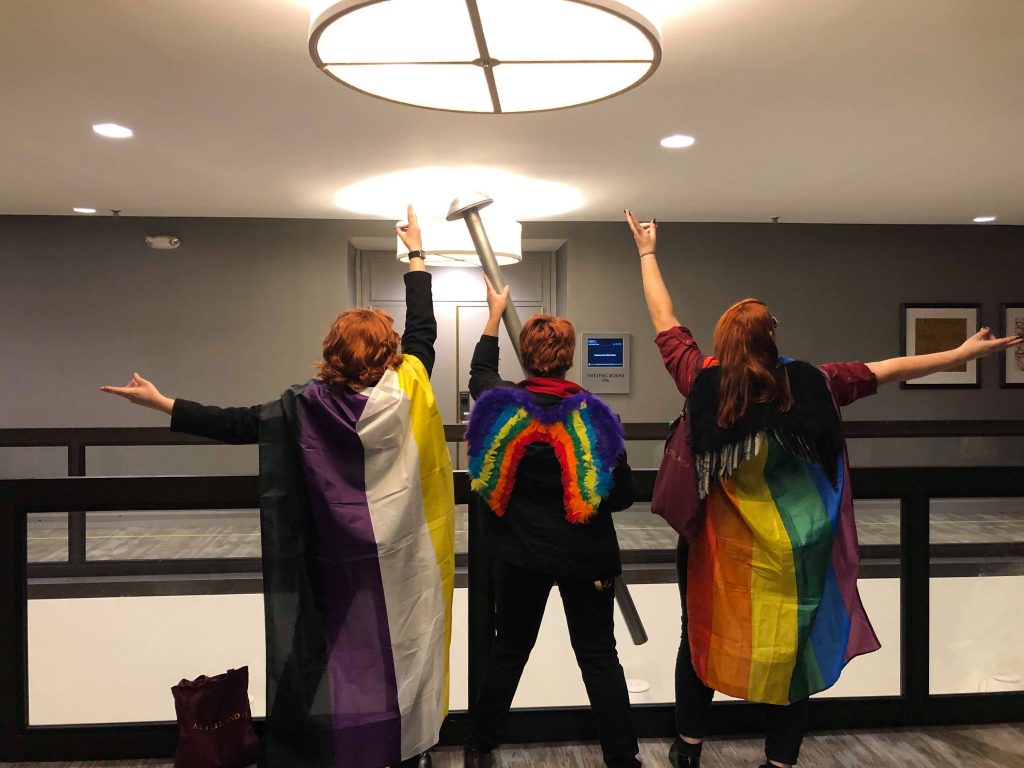
Coming out is complicated. Coming out while also being a geek at one of the largest conventions of the year however is a party you’ll never forget. Which is why we were dancing around a giant pin at Dragon Con with pride flags. Obviously.
Anyone in the LGBTQIA+ community can tell you that coming out is a process. In some ways it’s a single moment, and in others it’s never ending. My coming out process took over two years. In true geek nature, it culminated with a rainbow-tastic coming out party at Dragon Con.
Before I get to hosting a Pride Ball at the geek world’s most “extra” party con, I need to step back to how we got here.
Geek culture can be toxic and suffocating at times. But once it’s taken and flipped it can be one of the rare spaces to explore yourself along with the characters. Fanfiction, fan art, and various head canons all allow people to explore potential queer stories and themes even when the media itself shies away from presenting it as such.
Every once in awhile we receive validation from our sources. Oftentimes it’s understated and trimmed, such as Valkyrie’s bisexual representation in Thor: Ragnarok. On rare occasions it’s present and obvious such as Ruby and Saphhire’s wedding in Steven Universe season five. On extra rare occasions it is both obvious and fits your own personal identity, and such was my response to Good Omens.
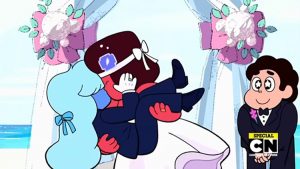
Representation in media matters. Representation in media allows coming out to be a little easier. The way I’ve described coming out post Good Omens nonbinary representation was that now I have a demon backing me. Crowley is able to function both as a reassurance during questioning moments as well as an example to those struggling to understand what I mean when I say I’m neither a man nor a woman.
This is extremely helpful because much like geek culture, coming out can be equally toxic and suffocating at times. If you don’t tap dance just so, your fair-weather allies might decide you don’t deserve their platitudes, and the local homophobe might even decide that your heartfelt Facebook post isn’t sufficient reason to still treat you like a human being. As I’m writing this the Supreme Court of the United States is deciding whether or not I deserve to be fired simply for existing as I am. The pressure is immense when deciding whether or not it is worth the risk to come out.
But once it’s taken and flipped, coming out is a chance to find belonging and solidarity in a community that understands what you’re going through.
Which brings us back to having a giant Pride Ball at Dragon Con. You see, when I came out a friend jokingly asked when my debutante ball would be. We had already scheduled to meet up at Dragon Con for the photo-op of a lifetime, and so a wonderful plan was formed in a way that only multiple Crowley cosplayers can form it.
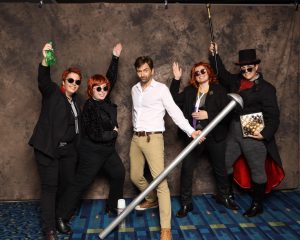
*Record scratch*
Hi, it’s your co-writer. Also joking friend. I bet you’re wondering what debutante balls have anything to do with any of this. (Yeah yeah, we both wrote the entire article, and yet there’s two separate author voice moments. Don’t think too hard about that…)
See, the origins of the phrase “coming out” had nothing at all to do with closets. Long before people constructed giant doorways for people to symbolically walk through on Coming Out Day, the queer community wasn’t even using the closet metaphor to describe the experience of hiding their identity. “Wearing a mask” and “taking off the mask” were the common terms, and that’s much more accurate than anything associated with the idiom, “skeletons in the closet,” which evokes the mental image of a serial killer hiding bodies.
Historically, whenever a queer person talked about “coming out,” the implication was something much more celebratory and affirming. Unfortunately I didn’t learn any of this until I’d already come out. I’m nonbinary too, and I came out on Coming Out Day last year. My post was perfect! And poised! And heartfelt! And compelling! And yet the entire process was also extremely lonely and vulnerable. I always hate feeling like I’m under a microscope or that the slightest misstep could bring everything crashing down, and that’s exactly what it’s like to come out in the modern sense. So much of the focus is on your non-queer friends. Educating. Emotional labor. Tap dancing.
Months later, I came across the following post by Tumblr user, Keplercryptids, about their experience reading a book called Gay New York and discovering the true meaning of coming out.
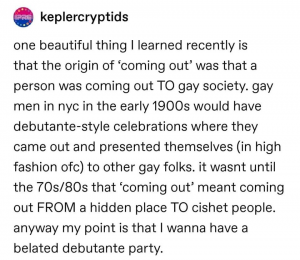
“Like much of campy gay terminology, “coming out” was an arch play on the language of women’s culture–in this case the expression used to refer to the ritual of a debutante’s being formally introduced to, or “coming out” into, the society of her cultural peers…A gay man’s coming out originally referred to his being formally presented to…enormous drag balls that were patterned on the debutante and masquerade balls of the dominant culture and were regularly held in New York, Chicago, New Orleans, Baltimore and other cities…Gay people…did not speak of coming out of what we call the “gay closet” but rather of coming out into what they called “homosexual society” or the “gay world,” a world neither so small, nor so isolated, nor, often, so hidden as “closet” implies.”
-George Chauncey, Gay New York: Gender, Urban Culture, and the Making of the Gay Male World 1890-1940
I felt like the hero in every good sci-fi movie when the Big Twist drops, and they finally discover which human joy their dystopia has been hiding from them for all these years. Coming Out was always meant to be OURS. I want everyone to experience it how we were always meant to. If you come out, that’s amazing! The world just got a little more colorful. You have a family of millions who would rejoice if we knew. That’s the energy you deserve. Simultaneously, you also deserve to have a “boring” experience as far as the rest of the world is concerned. (“I like kettle corn. Also I’m gay.” “Oh cool! I’m happy for you.”) If someone isn’t queer, but still has an overabundance of thoughts and feelings about your coming out, then most of that is probably about them. And your coming out should be about you.
I began seeing other friends’ coming out posts differently. I didn’t try to fight anyone’s grandma of course, but overall I was disappointed to watch so many friends eviscerating their very souls under bright spotlights, while so few of THEIR friends even reacted as excitedly or as appropriately as if they’d just gotten a new puppy.
Corellon’s New Puppy Litmus Test:
1. Would you say something similarly irrelevant, obvious, or awkward to a friend who just got a new puppy?
2. Then maybe you shouldn’t say it to a friend who just came out!Examples:
“Don’t worry, I’ll still be your friend.”
“My religion says dogs are unclean, but I graciously won’t hold this against you.”
“I had a puppy stuffed animal once, so I understand your experience exactly.”
“Can I just say that…you are an AMAZING person??? Always remember that a puppy can’t ever change that!”
And so I put on my sci-fi hero boots and began sharing the debutante ball screenshot on every single one of those coming out posts. I would ask when the party was. I would jokingly remind them that pride flags take some time to take to the dry cleaners, and a little advance notice would be nice. (Translation: “You deserve more than this. You were incredibly brave, but you shouldn’t have to be. You don’t just deserve ‘tolerance’ and ‘acceptance.’ You deserve utter celebration surrounded by queer friends, old and new.”)
Most just responded with a heart react. And then someone took me up on it.
*end record scratch*
That’s why there was a group of Good Omens cosplayers marching through multiple Dragon Con hotels on Sunday night wearing pride flags and carrying a giant pin. We invited multiple people to dance around a pin with us and noted that those among our community were naturally the most drawn in. We were able to find more nonbinary people to celebrate with simply by being ourselves and allowing them to find us. To be fair, the giant pin most definitely helped.
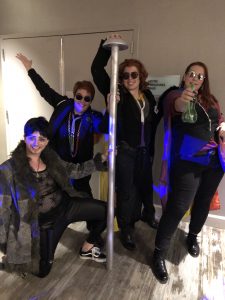
A geek debutante ball it turns out, is neither debutante, nor a ball. It is an energy matching your own in the most wonderful way possible. And when Good Omens inspires not only your cosplay, but your coming out story, well, a giant disco party around a pin it is.
I cannot describe how much more peaceful this party was than the process of publicly coming out to the cis-hetero community. I cannot explain how much easier it is to be celebrated among your community rather than needing to explain, yet again, why you are the way you are.
Coming Out Day is tomorrow. Don’t take this as a reason to cancel any plans to come out to the non-queer people in your life. Education and awareness are important too, and if you can safely be your true self around friends and biological family, then by all means, take off the mask! But it doesn’t need to be the focus. Think of it as coming out to an entire community that will celebrate you. If you’d like to do it in a geeky fashion? Find your inspiration and run with it.
Find your family locally:
CenterLink is an organization that has spent the past 25 years helping “LGBT Centers” grow and helping the queer community find local resources they need. If you’re nervous about coming out, you can start by researching your nearest center. Your first experience coming out can be with people who are guaranteed to accept you. If you don’t feel safe coming out, they can even help with advice and support. While nothing fixes everything, these centers can provide a resource for meeting people, attending events, and so much more.
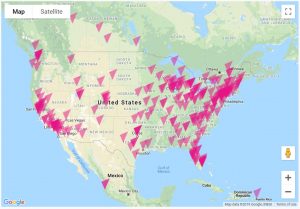
Other excellent places to search are Google Maps (in case that list isn’t up to date) and local queer-focused Facebook pages.
Find your family online:
If an in person option just really will not work for you, there are other options, and they can be far geekier. For example, both of the authors of this article are admins at LGBTQIA+ Fans of Good Omens. There are other queer spaces as well as queer friendly spaces, especially in fandoms that veer more rainbow in general.
What do you look for in a group? One that is a specific queer space is ideal, but there are friendly spaces out there. Look for groups that have specific inclusive rules. It’s an even better indication if more than one member of the admin team is out and proud. Ultimately you don’t need to say or do anything in any group unless you feel comfortable there and that will be different for everyone. It’s important to know that online community is an option if in person is not. For some people, it’s the only way they can safely participate in Coming Out Day.
Online communities can also help point you to queer-centric gatherings at conventions and elsewhere as well. We’ll be back at Dragon Con next year, of course, with more flags and perhaps two giant pins. Or a bathtub. Perhaps life sized rainbow wings. I haven’t quite decided what yet, but rest assured it will be very queer and very epic. And you’re welcome to come dance with us.
Because every color of the rainbow deserves to be celebrated.
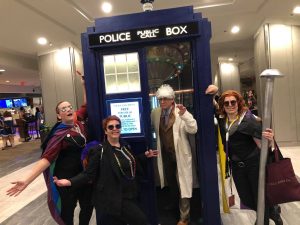
Author: Corellon Johnson and Caspian Casillas
Caspian (left) and Corellon (right) are two feral nonbinary Crowley cosplayers who have a lot of thoughts about Good Omens and nonbinary representation. If you’re seeing this joint bio instead of one of their individual ones, you’re probably reading an article about one or more of these topics.
Help support independent journalism. Subscribe to our Patreon.
Copyright © The Geekiary
Do not copy our content in whole to other websites. If you are reading this anywhere besides TheGeekiary.com, it has been stolen.Read our



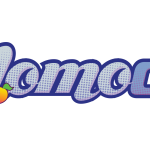

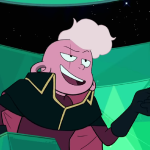

Author’s note (Corellon): Also shoutout to @PrideKnights on tumblr for their fierce energy and inspiration for the part about deserving to have a “boring” coming out as far as cis-het people are concerned.